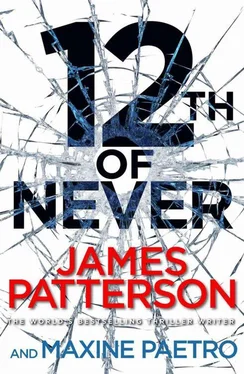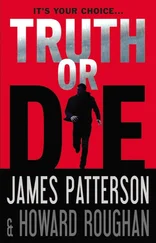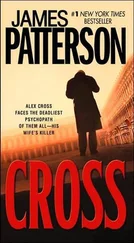He slipped into a persistent coma and was handcuffed to a bed in the prison wing of a nearby hospital, where he had been for the last two years.
I’d long hoped that Randolph Fish would wake up with his memory intact. There were four families who wanted to know where their daughters were buried, and nine families who wanted to watch Randolph Fish die in the chair.
Now I gripped the phone and said to Brady, “What’s his condition?”
“He spoke in full sentences,” Brady said. “He told the warden he’ll take the feds to the missing bodies if he gets a deal, and if he gets to talk to you. Do you want in on this, Boxer? Ron Parker asked for your assistance.”
I didn’t want to say no to Ron Parker.
“I’ll do it,” I told Brady, “but I can’t make it tomorrow. I just can’t.”
“Fish could go back into a coma. It happens, you know. Parker’s not going to wait,” he said.
“That’s okay.”
“Are you all right, Lindsay?”
“I’m absolutely terrific. Joe and I were just saying that these are the best days of our lives.”
“Uh-huh. Go feed your baby. I’ll ask Jacobi to call Parker. See what he can do.”
Chapter 57
JOE, JULIE, AND I were in Dr. Gordon’s office promptly at nine the next morning. I looked down into my baby’s sweet face, hoping for a smile, some little sign that would make me say, “She’s fine.”
“I’m not so happy with the results of the blood test,” Dr. Gordon said.
I tried to read her inscrutable face. I realized that Dr. Gordon was younger than I am. And for the first time, that really worried me. Did she have enough experience to help Julie? Was she the best doctor in the world?
“What about her blood tests? What’s wrong?”
“Her white blood cells are abnormal in shape.”
Abnormal? I grabbed the desk with both hands, as if to stop myself from lifting off and rocketing away from the planet. I had never heard more terrifying words in my life.
“What do you mean by ‘abnormal’?” I said.
Joe shielded the baby from me and from what the doctor was saying. He said, softly, “What’s the worst-case scenario?”
Dr. Gordon said, “Let’s not go to worst cases. We’re not at that point, not even close. I want to check Julie into the hospital and get a full clinical workup,” the doctor said. “I think she may have an infection, but I want a second opinion.”
“An infection like the flu? Is that what you mean?” I said, my grip on the desk relaxing a tad.
“I think so, but I want other doctors to look at her. Look, Lindsay, she’s not gaining weight. She’s running intermittent fevers. It could be just how Julie is, or maybe she picked up something from one of the firemen who delivered her. But I’m guessing.
“I want to test for everything, aggressively. We should do X-rays, biopsies, the works.”
I shouted, “Oh, my God. You don’t think she has the flu. What is this? What do you think she has?”
Joe shushed me and put his hand on Julie’s head.
Dr. Gordon said, “I’m going to make sure that next time you ask me what’s wrong, I can give you an unqualified answer. California Women’s has a wonderful pediatric facility. I’d like you to bring her over—now.”
I had been worried for weeks, and now I thought those weeks had been wasted, that we should have pushed harder for answers.
I blamed myself for not overriding Joe and taking Julie to the hospital the first time she had a fever. I should have followed my instincts. I should have done it.
“I’ll meet you at admitting,” Dr. Gordon said.
I held the baby as Joe drove. He looked drained. Gray. “We’ll get to the bottom of this, Linds. We won’t have to wonder anymore, and Julie will get better.”
Yeah? And how did Joe know that?
We found a spot in the outpatient parking, carried the baby through the pale stone lobby, and took the elevator to pediatrics.
We got through the check-in procedure without either one of us blowing up or going crazy. We met the radiologist, who handed Julie to a nurse, who snapped a bracelet around her tiny wrist—and took her away.
Dr. Gordon said, “She’s in very good hands. I’ll call you as soon as I have something to tell you.”
“We’ll be right here, in the waiting room,” I said.
“This will take a couple of days,” Dr. Gordon told us. “Please go home. There’s nothing you can do for your daughter by waiting here when you live ten blocks away. You can look in on her tonight.”
I had a good hard cry in the hospital lobby. Joe held me tight, and then he drove us home.
Chapter 58
AT SIX THIRTY the next morning, my former partner, chief of police Warren Jacobi, swooped down on Lake Street in his shiny black sedan. He pulled up to where I was waiting for him outside our apartment building, leaned across the seat, and opened the passenger-side door for me.
He took a look at my face and said, “Good morning, sunshine.”
“Don’t start with me, Jacobi. I haven’t slept.”
“You worried about our meeting with Fish?”
“I meant I haven’t slept since Julie was born.”
“Well, you do look like hell.” He laughed. “On you, it looks good.”
I pulled a face, got into the car, took a container out of the cup holder, and pried off the lid with my shaking hands. Jacobi was a worn-looking fifty-five, white-haired, jowly, and, to my eyes, beautiful.
“Julie is in the hospital,” I said.
“Shit. What for? What’s wrong with her?”
The coffee was black, two sugars. Jacobi knew how I like it. I strapped in, then told my former partner everything I knew about what was wrong with Julie.
I didn’t know much.
Jacobi listened as we cruised up Lake Street, the nose of the car pointed east toward Modesto and then south to the U.S. penitentiary in Atwater.
Jacobi said how sorry he was that the baby was sick, and he also told me that I always worry too much and that everything would be fine.
“Of course, when you stop worrying, that’s when things really turn to shit.”
“I’ve really missed you, Jacobi. Like a migraine.”
He laughed and got me to do it, too.
It was almost like old times.
During the ten years I worked with Jacobi, we logged innumerable twenty-hour days in a squad car, arrested a few dozen killers and unrepentant dirtbags, and we both took bullets one bad night in an unlit alley in the Tenderloin.
We could have died and almost did.
A year later, Jacobi stood in for my dead father and gave me away to Joe Molinari. I tripped down the petal-strewn path, fumbled the wedding ring, and Jacobi laughed out loud on the best day of my life. We’ve had hilarious times and horrific ones, but we’ve never doubted that we’re friends forever.
As Jacobi drove, I told him, “I’ve never been so scared, and I mean never. You don’t know what love is until you have a sick baby.”
Joe had insisted that I go to work and he’d promised he’d sit at the hospital all day, all night, never leave Julie alone. I’d left the house only a half hour before, but I called Joe anyway.
“Just—call me if you learn anything, anything at all.” “I will, sweetie. You know I will.”
After I hung up, Jacobi and I talked about the Faye Farmer case and the ugly shootings foreseen by the so-called clairvoyant professor.
And we talked about Randy Fish.
Jacobi said, “I’m glad that sack of crap is alive and can still use his shit for brains. Doubly glad he’s back in maximum security.”
In another couple of hours, we were going to be talking to that sack of crap. I hoped that, having almost died, Randy Fish would feel some compassion for the parents of the missing girls. He was on death row. He had nothing to lose by telling us where he’d disposed of their bodies.
Читать дальше












